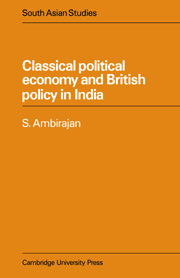Book contents
- Frontmatter
- Contents
- Dedication
- Acknowledgments
- 1 Introduction
- 2 Economic ideas and British policy towards India
- 3 Economic ideas and famine policy
- 4 Economic ideas and economic relations
- 5 Economic ideas and land taxation
- 6 Economic ideas and taxation policies
- 7 Political economy and a policy of economic development
- 8 The state and the policy for economic development
- 9 Conclusion
- Select bibliography
- Index
2 - Economic ideas and British policy towards India
Published online by Cambridge University Press: 31 March 2010
- Frontmatter
- Contents
- Dedication
- Acknowledgments
- 1 Introduction
- 2 Economic ideas and British policy towards India
- 3 Economic ideas and famine policy
- 4 Economic ideas and economic relations
- 5 Economic ideas and land taxation
- 6 Economic ideas and taxation policies
- 7 Political economy and a policy of economic development
- 8 The state and the policy for economic development
- 9 Conclusion
- Select bibliography
- Index
Summary
The question may be asked, ‘What have we done for India? India has been the nursery of great soldiers, administrators, financiers, statesmen; yet even to this hour she has hardly been governed with higher aims than as a field in which cadets of English families may push their fortunes, or as a market in which English merchants may with advantage sell their wares.
Bishop of Manchester (in a sermon given at the Manchester Cathedral on 29 March 1874)THE STATE AND THE COMPANY'S EMPIRE
As we are dealing with the formation of economic policies in India by individuals who owed their origin, allegiance and interests to Britain, it would be unreal to deal with the making of policies for India by itself without taking into account the policy adopted by the dominating towards the dominated country. It has already been observed that policies in India were affected by the modes of British thought, and in this chapter we propose to examine how the ideas of economists and others who were in a position to form public opinion influenced the attitudes and policy towards India as a subordinate country. How did the economists elucidate the relations between Britain on the one hand and the colonies on the other, through the application of economic theory to the subject of colonial trade and occupation? Did these conclusions have any impact on the policies pursued towards India?
- Type
- Chapter
- Information
- Classical Political Economy and British Policy in India , pp. 27 - 58Publisher: Cambridge University PressPrint publication year: 1978



